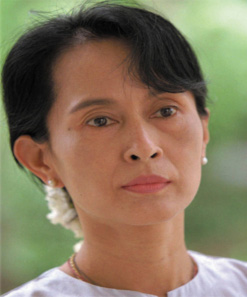Aung San Suu Kyi – Fighting for Democracy
Aug 12th, 2009 | By Neo | Category: Articles Some real life stories are stranger than the strangest movies ever made. The story of the life of Myanmar’s democracy champion Aung San Suu Kyi is one such story. Her name featured once again in newspapers all across the world when she was sentenced to an additional 18 month’s house arrest on August 11. This time her crime was that she had allowed an uninvited American guest, John Yettaw, to stay in her lakeside home.
Some real life stories are stranger than the strangest movies ever made. The story of the life of Myanmar’s democracy champion Aung San Suu Kyi is one such story. Her name featured once again in newspapers all across the world when she was sentenced to an additional 18 month’s house arrest on August 11. This time her crime was that she had allowed an uninvited American guest, John Yettaw, to stay in her lakeside home.
Born on June 19, 1945, Aung San Suu Kyi has spent almost 14 out of the last 20 years in detention.
She was the third child of General Aung San and Daw Khin Kyi. General Aung San played an important role in the Burmese fight for independence, but was assassinated six months before Burma got its independence. In 1960Suu Kyi moved to India with her mother, who was appointed the Burmese ambassador to India. In India, she joined Lady Shri Ram college and graduated in politics in 1964. Then, she moved to UK, and continued her education at St Hugh’s college at Oxford. Here she studied philosophy, politics and economics, and also met her future husband, Dr. Michael Aris . For the next three years she worked with the United Nations and spent time in Japan and Bhutan, before marrying and settling down in London. Here she gave birth to two sons – Alexander and Kim.
In 1988 she came back to Burma to look after her ill mother. Her return to Burma coincided with a major political upheaval taking place in Burma at the time. Thousands of demonstrators had taken to the street demanding democratic reforms. She joined the struggle as she felt she could not stay away from this struggle for democracy. In a speech, she said, “I could not, as my father’s daughter remain indifferent to all that was going on.”
In September, 1988, National League for Democracy was formed with Aung San Suu Kyi as it’s General Secretary. She was influenced by the philosophy of non-violence – advocated by Mahatma Gandhi and Martin Luther King, Jr. – and some Buddhist concepts. She was put under house arrest on 20 July, 1989. She was offered freedom if she agreed to leave the country, but she refused.
In 1990, her party won the general elections with a comfortable majority, despite the fact that she was under house arrest and had not contested the elections. The military junta, however, nullified the results and refused to handover power to the newly elected government. Aung San Suu Kyi was awarded the Nobel Peace Prize in 1991 for her peaceful struggle against the military junta.
Since then she has spent most of her time in detention.
July 20, 1989: Placed under house arrest in Rangoon under martial law that allows for detention without charge or trial for three years.
July 10, 1995: Released from house arrest.
September 23, 2000: Placed under house arrest.
May 6, 2002: Released after 19 months.
May 30, 2003: Arrested following the Depayin massacre she was held in secret detention for over 3 months before being returned to house arrest.
May 25, 2007: House arrest extended by one year flouting a direct appeal from U.N. Secretary-General to General Than Shwe.
October 24, 2007: Reached 12 years under house arrest, solidarity protests held at 12 cities around the world.
May 27, 2008: House arrest extended for another year, illegal under both international law and Burma’s own law.
August 11, 2009: House arrest extended for further 18 months due to “violation” arising from the May 2009 trespass incident.(Source :Wikipedia)
In spite of the continued detention and repression, Aung San suu Kyi appeared graceful and calm in her recent trial that spanned over 12 weeks. The decision of continuing her house arrest for another 18 months has been condemned by the US, the European Union, France and Britain, and the UN has asked for her immediate release. The decision to keep her under house arrest, however, is a tactical move by the military junta to keep Aung San Suu Kyi isolated from the masses till the next general elections, which are expected to be in May 2010.
The entire world community has condemned the detention of Aung San Suu Kyi, and many sanctions against Myanmar are already in place. In light of the recent verdict, it is certain that many new sanctions will be imposed upon the nation. The military junta in the country, however, refuses to give in. In the words of Ms Suu Kyi, they are fearful, fearful of losing power.
It is not power that corrupts but fear. Fear of losing power corrupts those who wield it and fear of the scourge of power corrupts those who are subject to it.





Really informational and well written. A must read for everyone interested in freedom struggles!
well written.plz write something about current position of LTTE.
awesome personality
[…] This post was Twitted by PYNTK […]
a very well written brief description. i loved it. it helped me a lot. thanx!!!
EXCELLENT
BRIEF
HELPFUL
very good written.